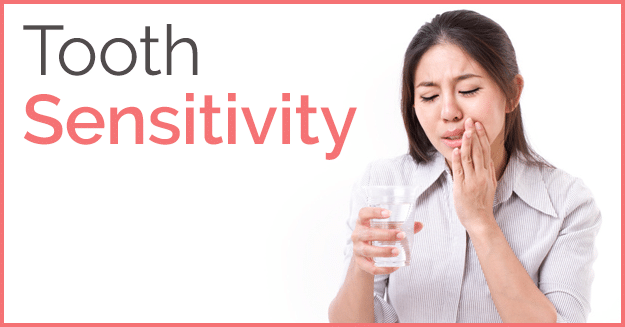Tooth sensitivity is something that affects a number of people. It is often caused by eating or drinking something hot, cold, sweet or acidic. Under normal conditions, the underlying dentin of the tooth (the layer that immediately surrounds the nerve) is covered by the enamel in the tooth crown, and the gums that surround the tooth. Over time, the enamel covering can get thinner, thus providing less protection. The gums can also recede over time, exposing the underlying root surface dentin.
The dentin contains a large numbers of pores or tubes that run from the outside of the tooth to the nerve in the center. When the dentin is exposed, these tubes can be stimulated by changes in temperature or certain foods.
What causes it?
Exposure of the dentin can occur due to a number of factors. Some of the more common reasons are:
- Gum recession due to age or improper tooth brushing.
- Acidic beverages (such as soda) that cause enamel erosion and dentin exposure.
- Tooth grinding : this may actually cause most or all of the teeth to feel sensitive.
- Brushing with a very abrasive toothpaste, brushing incorrectly and/or brushing more than three times a day could result in a loss of enamel.
- Gum disease, which can result in gum recession.
- A chipped or fractured tooth may expose the dentin.
In addition, some dental treatments can cause sensitivity. Treatments such as such as teeth whitening, professional dental cleanings, having braces put on or getting a filling placed have been known to cause sensitivity during or after the procedure.
What can I do about it?
The first step in doing something about dental sensitivity is to find out what the cause is – a dental professional can help you with this.
If the sensitivity is due to a cavity, a restoration can be placed. If gum disease is the cause, the dental professional can perform a thorough cleaning of the area.
If the sensitivity is due to exposed dentin, there are a number of steps you can take, as can your dental professional, to help reduce the sensitivity. These can include:
- At Home:
- Use a very soft bristle tooth brush, with low abrasive tooth paste.
- Brush correctly and do not over brush.
- Use a tooth paste specially formulated to soothe the nerve endings in the tooth.
- Use a high concentration fluoride toothpaste (given to you by the dental professional) to strengthen the tooth surface.
- The dental professional can:
- In Office Procedures:
- Fluoride varnish can be applied to exposed areas, strengthening the enamel and dentin.
- Fluoride foam or gel can be placed into a mouth tray; you then sit with this in your mouth for 3-5 minutes, providing the teeth with a high concentration of fluoride to strengthen the areas.
- Bonding agent, the material used to stick tooth colored restorations to teeth, can be used to seal the dentin surface and provide a barrier to the stimuli that cause sensitivity.
In the end, whether you need an in-office procedure or over-the-counter products, the most important step is to see a dental professional so that he or she can determine the cause of the tooth sensitivity and help you find a solution that will work.



+1.svg)
